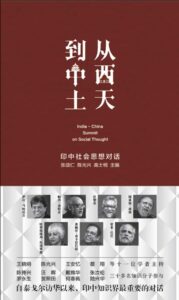
Zhang Songren, Chen Guangxing and Gao Shiming ed. (张颂仁,陈光兴,高士明 主编 )
Shanghai, Shanghai People’s Press, 2014.
Reviewed by Yifan Cao (Ph.D. candidate of Sichuan University, HYI Visiting Fellow)
From Xitian [Western Heaven] to Zhongtu [Central Mainland]: Indo-Chinese Dialogues on Social Thought, [1] part of the “Western Heavens” series, was published by Shanghai People’s Publishing House in January 2014. It contains fourteen lectures from renowned Indian scholars who attended the 2010 Shanghai Art Biennale forum, which is regarded as the most significant Indo-Chinese intellectual exchange since Tagore’s visit in 1924. Thus, this book captures discussions between these Indian scholars and their Chinese counterparts[2] on various contemporary issues such as modernity, globalization, post-colonialism, feminism, nationalism, and contemporary art and culture.
The collection is divided into eight sections. The first seven sections compile fourteen keynote speeches by seven Indian scholars respectively. Each section includes a short biography of the speaker, two translated speeches, some comments from Chinese scholars, and subsequent dialogues between Chinese and Indian scholars.
The first lecture by Sarat Maharaj delves into the drive towards modernity in India and Asia at large as well as the function of the biennale institution. He reflects on modernity and the participation of Asian nations (particularly India and China) in the process of Western modernization as active participants and not only as exploited regions. In “Knowledge Production in Visual Arts vis a vis Other Academic Disciplines,” he explores whether art constitutes knowledge production, how it relates to other fields, and who its true producers are.
Partha Chatterjee analyzes Rabindranath Tagore’s critique of nationalism and its relevance to Chinese historical and cultural contexts. He argues that Tagore’s universal humanism critiques the moral and ethical dimensions of nationalism rather than dismissing national liberation struggles.
In “Sustainability and the Crisis of Transcendence,” Prasenjit Duara examines sustainability from a philosophical perspective and highlights the necessity of integrating ethical considerations into environmental policy and education. The second lecture discusses the development of secularism in China and emphasizes the integration of Confucian ethics with governance, which contrasts with Western secularism that separates politics and religion.
By exploring the psychological impacts of colonialism on post-colonial societies in the first speech, Ashis Nandy holds that colonial legacies hinder these societies from mourning their past, which has an impact on their cultural and creative expression. In “Politics of Democracy and Politics of Religion in a Post-Secular Age,” he investigates the evolving dynamics of democracy and religion in modern society, especially under post-secular conditions.
Tejaswini Niranjana’s speeches tackle complex identities within India and the global context of gender, culture, and national identity, examining how these identities are portrayed and shaped through various mediums like film.
The first lecture by Dipesh Chakrabarty addresses the West as a shifting signifier and shows how India’s understanding of itself and its strategies in interacting with Western political and cultural norms have been shaped by the changing connotations of the term “West”. Chakrabarty also re-evaluates subaltern histories in the second speech, embracing the concept of belatedness as a space of potential instead of deficiency. This further conversation revolves around the rewriting of historical narratives to include those traditionally marginalized or overlooked by mainstream historical accounts.
Homi K. Bhabha criticizes traditional dichotomies between Western and non-Western cultures in “Barbarism and Civility: Thoughts on the Culture of Globalization,” underscoring the complexities of modern identities that are shaped by global influences. Furthermore, he studies how traditional notions of cultural identity and meaning are questioned and redefined in “On Diasporic Art: Thoughts on the Displacement of Meaning”.
Chinese scholars engaged deeply with these lectures and commended the nuanced understanding provided on topics like diaspora, post-colonial identity, and the interplay of cultural narratives in a global context. They showed a great interest in exploring the connections between China’s modernization, cultural identity, and historical narrative reconstruction, as well as whether global theories may be applied to the Chinese context.
The final section, “Ruminations,” comprises eleven short essays by Chinese scholars, such as Zhang Songren, Chen Guangxing, Gao Shiming, Liang Jie, and He Zhaotian. These essays generally praise the Indian scholars’ deep insights on various modern issues in the Asian context, such as migration, post-colonial identity, and cultural narratives. Specifically, they commended the global perspective provided by the Indian theorists, addressing suffering and inequality while grounding their research in historical experience and critical thinking. As Zhang Songren notes, this grassroots approach that focuses on real-world issues is beneficial for Chinese audiences who are used to grand narratives.[3]
In summary, Indo-Chinese Dialogues on Social Thought provides a robust platform for India-China academic exchange through the interplay between artistic works from the Shanghai Biennale and theoretical and cultural communications. The dialogue on modernity between India and China is relevant on a global level. As key contributors to Western modernization, India and China can provide unique perspectives in addressing the limitations of Western modernity and enhance a global understanding of modernization. While the broad range of topics sometimes leads to dispersed discussions, the book offers valuable insights into cultural and intellectual dynamics.
[1] The book’s title, “From Xitian to Zhongtu,” references China’s historical learning from India, specifically Buddhism’s spread eastward, implying that this summit uses India to reflect on China’s modernization path and its challenges.
[2] These Chinese scholars actively engaged in fields such as history, culture, politics, and gender studies, like Dai Jinhua, Qiu Zhijie, Wang Hui, Zhang Rulun, Chen Yizhong, He Zhaotian, Li Zhengxun, Wei Yueping, Luo Yongsheng, Meng Zhongjie, Lu Xinghua, Chen Jieren, and He Chunrui, etc.
[3] Songren Zhang, Guangxing Chen, and Shiming Gao, eds. From Xitian to Zhongtu: Indo-Chinese Dialogues on Social Thought (India-China Summit on Social Thought). Shanghai: Shanghai People’s Press, 2014, p.5.
